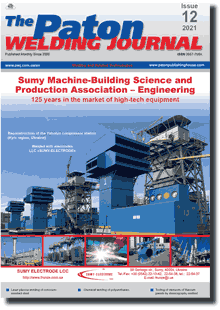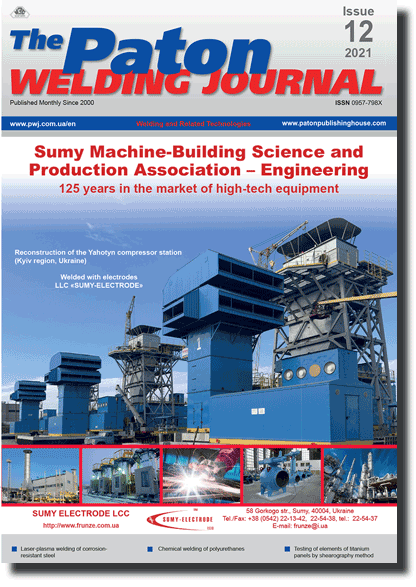| 2021 №12 (08) |
DOI of Article 10.37434/tpwj2021.12.01 |
2021 №12 (02) |

The Paton Welding Journal, 2021, #12, 3-8 pages
Influence of a forced mode of pulsed-arc welding on the structure and properties of joints of steel of the strength class C440
A.V. Zavdoveev1, V.D. Poznyakov1, M. Rogante2, S.L. Zhdanov1, T.G. Solomiichuk1, O.A. Shyshkevych1
1E.O. Paton Electric Welding Institute of the NASU. 11 Kazymyr Malevych Str., 03150, Kyiv, Ukraine. E-mail: paton39@ukr.net
2Rogante Engineering Office 62012 Civitanova Marche, Italy
Abstract
In the work the influence of a pulsed-arc forced welding on the structure formation and properties of welds and HAZ metal as compared to standard pulsed-arc welding was studied. On the example of a high-strength S460M steel, it was shown that a pulsed-arc forced welding can effectively regulate the structural formation. Change in the welding thermal cycle, namely, accelerated heating and delayed cooling leads to the formation of the optimal structure in the weld and HAZ, which allows obtaining high strength and resistance to brittle fracture. Advantages of a pulsed-arc forced welding allow welding without edge preparation, which significantly improves the efficiency of the process as a whole.
Keywords: pulsed-arc welding, high-strength steel, weld and HAZ metal, thermodeformation cycle, structure, properties of welded joints
Received 30.06.2021і
Accepted: 24.12.2021
References
1. Lee, C.H., Shin, H.S., Park, K.T. (2012) Evaluation of high strength TMCP steel weld for use in cold regions. J. Constr. Steel Res., 74, 134-139. https://doi.org/10.1016/j.jcsr.2012.02.0122. Medina, S.F., Gómez, M., Gómez, P.P. (2010) Effects of v and Nb on static recrystallisation of austenite and precipitate size in microalloyed steels. J. Mater. Sci., 45, 5553-5557. https://doi.org/10.1007/s10853-010-4616-z
3. Fossaert, C., Rees, G., Maurickx, T., Bhadeshia, H.K.D.H. (1995) The effect of niobium on the hardenability of microalloyed austenite. Metall. Mater. Trans. A,. 26, 21-30. https://doi.org/10.1007/BF02669791
4. Nazarov, A.V., Yakushev, E.V., Shabalov, I.P. et al. (2014) Comparison of weldability of high-strength pipe steels microalloyed with niobium, niobium and vanadium. Metallurgist, 7, 911-917. https://doi.org/10.1007/s11015-014-9821-6
5. Zavdoveev, A., Poznyakov, V., Baudin, T. et al. (2021) Welding Thermal Cycle Impact on the Microstructure and Mechanical Properties of Thermo-Mechanical Control Process Steels. Steel research international, 92(6), p.2000645. https://doi.org/10.1002/srin.202000645
6. Needham, J.C., Carter, A.W. (1965) Material transfer characteristics with pulsed current. Brit. Weld. J., 5, 229-241.
7. Palani, P.K., Murugan, N. (2006) Selection of parameters of pulsed current gas metal arc welding. Journal of Materials Processing Technology, 172, 1-10. https://doi.org/10.1016/j.jmatprotec.2005.07.013
8. Tong, H., Ueyama, T. et al. (2001) Quality and productivity improvement in aluminium alloy thin sheet welding using alternating current pulsed metal inert gas welding system. Sci. Technol. Weld. Join., 6 (4), 203-208. https://doi.org/10.1179/136217101101538776
9. Poznyakov, V.D., Zavdoveev, A.V., Gajvoronsky, A.A. et al. (2018) Effect of pulsed-arc welding modes on the parameters of welded joints produced with Sv-08Kh20N9G7T wire. The Paton Welding J., 9, 7-12. https://doi.org/10.15407/tpwj2018.09.02
10. Amin, M., Ahmed, N. (1987) Synergic control in MIG welding 2-power current controllers for steady dc open arc operation. Met. Construct., 6, 331-340. 11. Rajasekaran, S. (1999) Weld bead characteristics in pulsed GMA welding of Al-Mg alloys. Weld. J., 78 (12), 397-407.
12. Zavdoveev, A.V., Poznyakov, V.D., Rogante, M. et al. (2020) Features of structure formation and properties of joints of S460M steel made by pulsed-arc welding. The Paton Welding J., 6, 9-13. https://doi.org/10.37434/tpwj2020.06.02
Suggested Citation
A.V. Zavdoveev, V.D. Poznyakov, M. Rogante, S.L. Zhdanov, T.G. Solomiichuk, O.A. Shyshkevych (2021) Influence of a forced mode of pulsed-arc welding on the structure and properties of joints of steel of the strength class C440. The Paton Welding J., 12, 3-8.The cost of subscription/purchase order journals or individual articles
| Journal/Currency | Annual Set | 1 issue printed |
1 issue |
one article |
| TPWJ/USD | 384 $ | 32 $ | 26 $ | 13 $ |
| TPWJ/EUR | 348 € | 29 € | 24 € | 12 € |
| TPWJ/UAH | 7200 UAH | 600 UAH | 600 UAH | 280 UAH |
| AS/UAH | 1800 UAH | 300 UAH | 300 UAH | 150 UAH |
| AS/USD | 192 $ | 32 $ | 26 $ | 13 $ |
| AS/EUR | 180 € | 30 € | 25 € | 12 € |
| SEM/UAH | 1200 UAH | 300 UAH | 300 UAH | 150 UAH |
| SEM/USD | 128 $ | 32 $ | 26 $ | 13 $ |
| SEM/EUR | 120 € | 30 € | 25 € | 12 € |
| TDNK/UAH | 1200 UAH | 300 UAH | 300 UAH | 150 UAH |
| TDNK/USD | 128 $ | 32 $ | 26 $ | 13 $ |
| TDNK/EUR | 120 € | 30 € | 25 € | 15 € |
AS = «Automatic Welding» - 6 issues per year;
TPWJ = «PATON WELDING JOURNAL» - 12 issues per year;
SEM = «Electrometallurgy Today» - 4 issues per year;
TDNK = «Technical Diagnostics and Non-Destructive Testing» - 4 issues per year.


